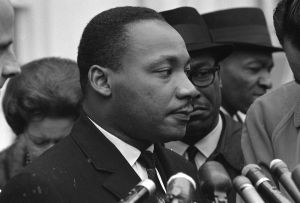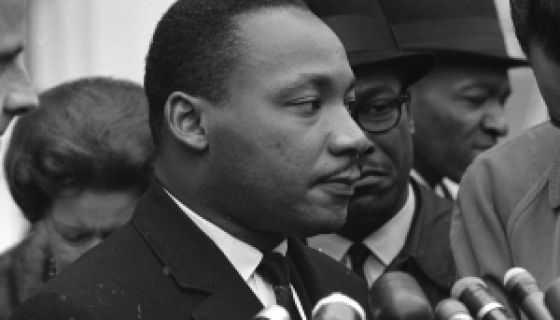
In April 1968, my sons went to Memphis to help organize a struggle by the city’s sanitation workers to achieve better wages and working conditions. I wondered about M.L.’s involvement in this, whether or not he was spreading his concerns and his energies too thin. But again he was right. There could be no real separation between exploiting a man because of his color and taking advantage of his economic condition to control him politically. Exploitation didn’t need to be seen only in terms of segregation. It involved all people, white and black, in the continuing human drive toward freedom, toward personal dignity within a just society. In Memphis, M.L.’s joint efforts with the workers brought out the old charge that he was, inside, more Communist than Baptist, which may have been the silliest thing anybody ever said about any person in America.
M.L. had been able to convince his brother, who was extremely skeptical in the beginning, that he too could make a difference in the kind of America that would enter the twenty-first century. The nation could be changed. The cracks in the armor of racist attitudes were visible all over the South. Maybe the time had been ripe before, but M.L. could see that now was an excellent moment in history to move a nation beyond itself. He sensed that Americans would respond emotionally to what he was now doing, that their passions could be cooled, then turned around into a force that would make the country into the place it should always have been. We have the resources, he would explain to me. We have the means, and the human energy needed is at its peak. . . .
The tension of those months took a heavy toll on Bunch, who was always aware of the pressure both the boys were under in their daily lives. The sound of a telephone, our doorbell ringing, any call that brought with it some news, edged up on us like a series of loud, sudden alarms. M.L. knew he had to share with his mother the changing nature of events as they involved him. Each moment he was away, out of touch with her, became an eternity of waiting for the next indication of any kind that he was all right.
He came to Atlanta and had dinner one evening with his mother and me. Some of the things he’d told me earlier came as no surprise, but both of us understood how difficult the information was going to be for Bunch to handle. Several reliable sources, both private and from within the federal government, concluded that attempts would soon be made on M.L.’s life. Money was involved. Professional killers were being recruited.
After dinner, the three of us sat out on our patio and enjoyed the late-setting sun of a warm, clear evening. Had I chosen M.L.’s words, perhaps I wouldn’t have been so blunt. He felt, though, that out of respect for his mother, he couldn’t be less than candid with her. “Mother,” he said, “there are some things I want you to know.”
She didn’t want to listen, not then, on that quiet Sunday when it was so good to laugh about childhood, and remember tears easily replaced with laughter back when everything seemed so much less dangerous.
“There’s a chance, Mother, that someone is going to try to kill me, and it could happen without any warning at all.” M.L. said this quickly, then stood up and walked to the far end of the patio. We sat silently, knowing that for this moment at least there couldn’t be any words. The same emotions that caused Bunch and me to urge M.L. to leave the movement more than ten years before were all still there. But saying these things now could bring no relief, only an intensity to the suffering we all carried. The great weight of that, I still believe, came from the certainty all of us had that what M.L. had chosen to do was unquestionably right.
We had been aware of the dangers, each out of our own experiences with the South we knew—M.L., his mother and I. A time had come. To avoid it was impossible, even as avoiding the coming of darkness in the evening would have been impossible. But word was moving through our part of the world. People were reporting conversations overheard in restaurants, in taverns, on street corners, that indicated serious efforts to plot against M.L. as a leader of this movement that was changing so much in America so quickly. Police departments had been alerted. The talk of hired killers being on the loose and following M.L. was now past the stage of rumor and hearsay. Police officers who had never been in sympathy with our cause were nevertheless concerned about anything happening to my son in one of their towns or cities. It simply wouldn’t have looked good, I suppose, for all these law-and-order advocates to be unprepared for lawbreakers whose intention was to commit murder.
“But I don’t want you to worry over any of this,” M.L. said, returning to his mother’s side. “I have to go on with my work, no matter what happens now, because my involvement is too complete to stop. Sometimes I do want to get away for a while, go someplace with Coretta and the kids and be Reverend King and family, having a few quiet days like any other Americans. But I know it’s too late for any of that now. And if mine isn’t to be a long life, Mother, Dad, well then I respect that, as you’ve always taught us to respect it as God’s will.”
We ached when he left that evening, deep inside, and though we tried to comfort each other with small talk about neighbors and church folks and even our earliest hours together, nothing could remove the unspoken pain we were sharing.
http://time.com/4629718/mlk-day-daddy-king-excerpt/?xid=time_socialflow_twitter
















